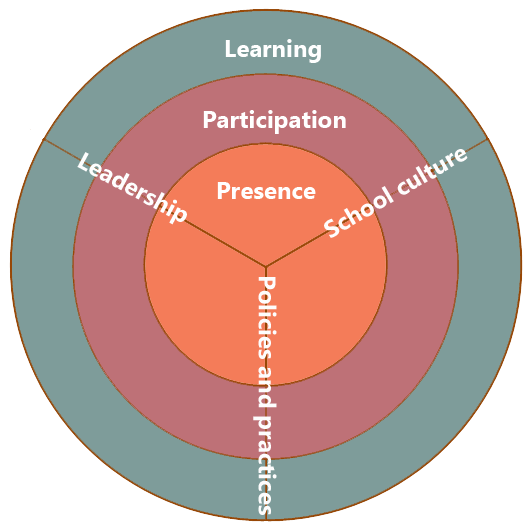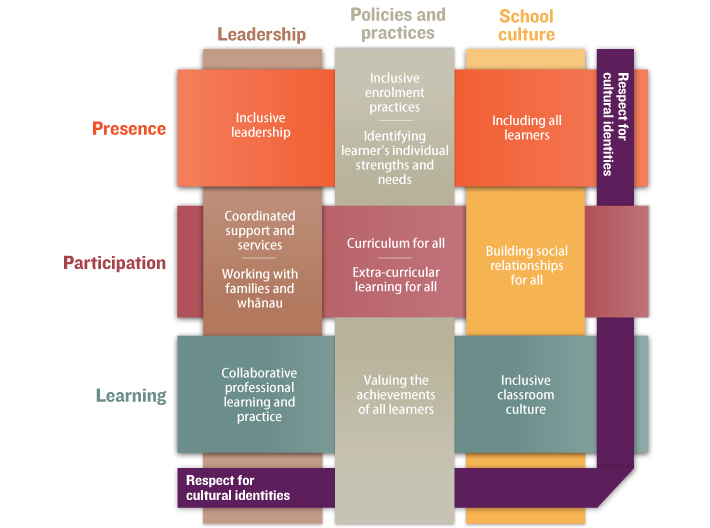Themes and sub-concepts explored in the Inclusive Practices Tools
The Inclusive Practices tools and reports are structured in two dimensions around six key themes that research indicates are key aspects of inclusive practice. These six themes are shown in the diagram below:

The placement of Presence at the heart of the diagram shows that this is a foundational concept on which the other themes build.
Three Inclusion themes explore inclusive education practices from the learner’s perspective. They are:
- Presence: all students are welcome to enrol and be included at their local school
- Participation (and engagement): all students take part in all aspects of school life (e.g., both curricula and extra-curricular activities)
- Learning (and achievement): all students’ learning needs are recognised and met
Three School systems themes are positioned as cross-cutting concepts. These themes explore different layers of school life. They are:
- Leadership: school leaders and leadership processes display a commitment to, and promote, inclusive education practices
- Policies and practices: school policies and practices display a commitment to, and promote, inclusive education practices
- School culture: school culture models a commitment to, and promotes, inclusive education practices
To provide more detail about these six themes, the Inclusive Practices Tools explore 13 sub-concepts (see table below). Most of the sub-concepts map to two main themes. The sub-concept, Respect for cultural identities, is woven throughout the themes.

The focus of each sub-concept is shown in the table below. The sub-concepts are organised under the themes of Presence, Participation, and Learning.
|
Theme |
Sub-concept |
This sub-concept explores the extent to which… |
Respect for cultural identities |
... school practices acknowledge and affirm the cultural backgrounds of students, parents and whānau. | |
Presence |
Inclusive leadership |
…school leaders and the board of trustees demonstrate a commitment to inclusive education practices and qualities such as manaakitanga (leading with moral purpose), ako (being a learner), and awhinatanga (guiding and supporting) as they work to ensure the school reduces barriers to learning for all students. |
|
Inclusive enrolment practices |
…school policies and practices support all students from the local community, and their family and whānau, to feel welcome and actively supported to make the transition to and from school. | |
|
Including all learners |
… the school values diversity, and creates a sense of belonging and safety for all. | |
|
Identifying learner’s individual strengths and needs |
…the school has effective systems (which include consulting with students) for identifying the individual interests, strengths, learning and social needs, and next steps for each student. | |
Participation (and engagement) |
Coordinated support and services |
…the school has a coordinated and effective approach to addressing barriers to learning and providing support and specialist services to students and their teachers. |
| Working with families and whānau |
…school staff work in a collaborative and culturally-responsive way with parents, whānau, and students in order to identify, support, and value the individual learning and social needs of each student. |
|
|
Curriculum for all |
…the classroom learning programme is planned to: provide each student with learning experiences and challenges that relate to the NZ Curriculum and Te Marautanga o Aotearoa as well as their interests, needs and goals. | |
|
Extra-curricular learning for all |
…all students take part in the full range of learning experiences outside the classroom (such as socialising at break times, and physical activity, sporting, cultural, school camp and other LEOTC activities). | |
|
Building social relationships for all |
…staff model effective relationship building strategies and all students are encouraged and supported to establish and maintain relationships and friendships. | |
Learning (and achievement) |
Inclusive classroom culture
|
… classroom teachers model and promote a culture that values diversity and creates a sense of belonging for all students. |
|
Valuing the achievements of all learners
|
…all students make progress relating to their goals, and their successes and achievements are recognised and valued; the learning of students is assessed and supported through use of recognised assessment approaches and the NZ Qualifications Framework. | |
|
Collaborative professional learning and practice
|
…teachers and specialist staff work together to support the individual learning needs of each student, and have access to effective professional learning. | |